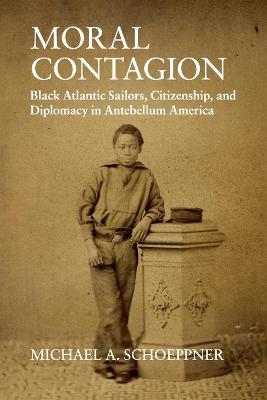
Moral Contagion
Black Atlantic Sailors, Citizenship, and Diplomacy in Antebellum America
Seiten
2020
Cambridge University Press (Verlag)
978-1-108-45512-1 (ISBN)
Cambridge University Press (Verlag)
978-1-108-45512-1 (ISBN)
During the Antebellum era, thousands of free black sailors were arrested for violating the Negro Seamen Acts. In retelling the harrowing experiences of free black sailors, Moral Contagion highlights the central roles that race and international diplomacy played in the development of American citizenship.
Between 1822 and 1857, eight Southern states barred the ingress of all free black maritime workers. According to lawmakers, they carried a 'moral contagion' of abolitionism and black autonomy that could be transmitted to local slaves. Those seamen who arrived in Southern ports in violation of the laws faced incarceration, corporal punishment, an incipient form of convict leasing, and even punitive enslavement. The sailors, their captains, abolitionists, and British diplomatic agents protested this treatment. They wrote letters, published tracts, cajoled elected officials, pleaded with Southern officials, and litigated in state and federal courts. By deploying a progressive and sweeping notion of national citizenship - one that guaranteed a number of rights against state regulation - they exposed the ambiguity and potential power of national citizenship as a legal category. Ultimately, the Fourteenth Amendment recognized the robust understanding of citizenship championed by Antebellum free people of color, by people afflicted with 'moral contagion'.
Between 1822 and 1857, eight Southern states barred the ingress of all free black maritime workers. According to lawmakers, they carried a 'moral contagion' of abolitionism and black autonomy that could be transmitted to local slaves. Those seamen who arrived in Southern ports in violation of the laws faced incarceration, corporal punishment, an incipient form of convict leasing, and even punitive enslavement. The sailors, their captains, abolitionists, and British diplomatic agents protested this treatment. They wrote letters, published tracts, cajoled elected officials, pleaded with Southern officials, and litigated in state and federal courts. By deploying a progressive and sweeping notion of national citizenship - one that guaranteed a number of rights against state regulation - they exposed the ambiguity and potential power of national citizenship as a legal category. Ultimately, the Fourteenth Amendment recognized the robust understanding of citizenship championed by Antebellum free people of color, by people afflicted with 'moral contagion'.
Michael A. Schoeppner is Assistant Professor of History at the University of Maine, Farmington.
Introduction; 1. The Atlantic's dangerous undercurrents; 2. Containing a moral contagion, 1822–9; 3. The contagion spreads, 1829–33; 4. Confronting a pandemic, 1834–42; 5. 'Foreign' emissaries and rights discourse, 1842–7; 6. Sacrificing black citizenship, 1848–59; 7. From the decks to the jails to assembly halls: black sailors, their communities, and the fight for black citizenship; Epilogue.
| Erscheinungsdatum | 13.07.2020 |
|---|---|
| Reihe/Serie | Studies in Legal History |
| Zusatzinfo | Worked examples or Exercises |
| Verlagsort | Cambridge |
| Sprache | englisch |
| Maße | 230 x 150 mm |
| Gewicht | 420 g |
| Themenwelt | Geschichte ► Teilgebiete der Geschichte ► Kulturgeschichte |
| Recht / Steuern ► EU / Internationales Recht | |
| Recht / Steuern ► Öffentliches Recht ► Verfassungsrecht | |
| Sozialwissenschaften ► Ethnologie | |
| Sozialwissenschaften ► Soziologie | |
| ISBN-10 | 1-108-45512-3 / 1108455123 |
| ISBN-13 | 978-1-108-45512-1 / 9781108455121 |
| Zustand | Neuware |
| Haben Sie eine Frage zum Produkt? |
Mehr entdecken
aus dem Bereich
aus dem Bereich
der stille Abschied vom bäuerlichen Leben in Deutschland
Buch | Hardcover (2023)
C.H.Beck (Verlag)
CHF 32,15
vom Mittelalter bis zur Gegenwart
Buch | Softcover (2024)
C.H.Beck (Verlag)
CHF 16,80


